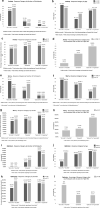Assessing the clinical utility of genetic risk scores for targeted cancer screening
- PMID: 33482857
- PMCID: PMC7821544
- DOI: 10.1186/s12967-020-02699-w
Assessing the clinical utility of genetic risk scores for targeted cancer screening
Abstract
Background: Genome-wide association studies have identified thousands of disease-associated single nucleotide polymorphisms (SNPs). A subset of these SNPs may be additively combined to generate genetic risk scores (GRSs) that confer risk for a specific disease. Although the clinical validity of GRSs to predict risk of specific diseases has been well established, there is still a great need to determine their clinical utility by applying GRSs in primary care for cancer risk assessment and targeted intervention.
Methods: This clinical study involved 281 primary care patients without a personal history of breast, prostate or colorectal cancer who were 40-70 years old. DNA was obtained from a pre-existing biobank at NorthShore University HealthSystem. GRSs for colorectal cancer and breast or prostate cancer were calculated and shared with participants through their primary care provider. Additional data was gathered using questionnaires as well as electronic medical record information. A t-test or Chi-square test was applied for comparison of demographic and key clinical variables among different groups.
Results: The median age of the 281 participants was 58 years and the majority were female (66.6%). One hundred one (36.9%) participants received 2 low risk scores, 99 (35.2%) received 1 low risk and 1 average risk score, 37 (13.2%) received 1 low risk and 1 high risk score, 23 (8.2%) received 2 average risk scores, 21 (7.5%) received 1 average risk and 1 high risk score, and no one received 2 high risk scores. Before receiving GRSs, younger patients and women reported significantly more worry about risk of developing cancer. After receiving GRSs, those who received at least one high GRS reported significantly more worry about developing cancer. There were no significant differences found between gender, age, or GRS with regards to participants' reported optimism about their future health neither before nor after receiving GRS results.
Conclusions: Genetic risk scores that quantify an individual's risk of developing breast, prostate and colorectal cancers as compared with a race-defined population average risk have potential clinical utility as a tool for risk stratification and to guide cancer screening in a primary care setting.
Keywords: Breast cancer; Cancer screening; Colorectal cancer; Genetic risk score; Prostate cancer; Single nucleotide polymorphism; Translational genomics.
Conflict of interest statement
The authors declare that they have no competing interests.
Figures
References
Publication types
MeSH terms
LinkOut - more resources
Full Text Sources
Other Literature Sources
Medical




